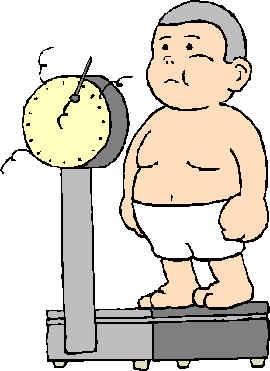|
Can You Name 1 Diet Myth
|
Myth #1: If you stick to your diet, you don’t need to exercise to lose weight. If Myth #1 was true, the whole world would be thin because most people have tried to lose weight this way. This diet myth is listed first because it is probably the one that is believed the most. Wouldn't it be nice if the pounds just came off without breaking a sweat? Forget about it!
To maintain your body weight, the calories you take in should equal the calories you expend, so the most effective way to lose weight is by reducing calories and increasing exercise. However, exercise is important even if you are not trying to lose weight, as it also improves cardiovascular health, circulation and decreases your risk of heart disease and diabetes. Doctors have stated that it is better to be fit and slightly overweight than thin and unfit, as physical activity is as important as weight in preventing heart disease. It is advisable to start off slowly before building up to a more rigorous plan. For example, take the stairs instead of the elevator or walk to the next bus stop instead of waiting at the stop. If you exercise and have a healthy diet, you will find it easier to lose weight and keep it off. Counting calories can be effective.
Myth #2: Diets based on single foods (i.e. the cabbage soup, grapefruit or egg diets) are the best way to lose weight. This is another one of those diet myths that has tricked many people into thinking weight loss is easy. Diets based on a particular food or food type promise rapid weight loss in a short period of time, but only work because they severely restrict calories. These diets are unsustainable long-term and can lead to deficiencies since single foods don’t contain the range of nutrients we need to stay healthy. The Academy of General Dentistry suggests that certain diets like this can even negatively affect oral health since they lack nutrients like calcium and vitamin D, which are necessary for maintaining healthy teeth and gums.

Myth #3: Low-carbohydrate, high-protein diets are the best way to lose weight. People who follow ‘low-carb’ diets tend to lose weight initially, but much of this weight is water. Many may dispute this diet myth. Of course the Atkins Diet comes to mind. Here is the problem with weight loss method. Since calories from carbs are the first thing our body uses for fuel, following a low-carb diet forces the body to quickly use this energy, then revert to stored carbs (known as glycogen) from the liver and muscles for energy. Since water is stored in the body with glycogen, you lose water as this glycogen is used for energy. Therefore most of the weight loss that occurs at this point is water and not fat. Just like the other diet myths mentioned here, practitioners of this method end up dissapointed. Once these stored carbs are used up, the body then relies on protein for energy and as a result, compounds called ketones are produced. These can be dangerous, particularly for people with medical problems such as heart disease, hypertension, kidney disease, and diabetes because the brain relies on glucose for energy, but ketones don’t provide energy for the brain. The body therefore tries to eliminate ketones through the liver and kidneys, which puts a severe strain on these organs because of the toxicity of ketones to the body. For people with metabolic problems, ketones are particularly hard to metabolize and eliminate. Due to the high level of ketones produced in a low-carb/high-protein diet, you may also experience dehydration, weakness, nausea and, in severe cases, gout and kidney problems. Additionally, many low-carb/high-protein diets can be problematic if the protein you eat is high in saturated fat (such as fatty bacon or cheese), because it increases the risk of heart disease. Despite the belief that carbs are fattening, fat is much higher in calories than carbohydrates. Current nutritional advice advocates a low-fat diet.

Myth #4: A diet is successful only if you lose more than two pounds a week. Wow! This diet myth might be the greatest diet myth on the page. Your main goal when trying to lose weight is to reduce fat rather than muscle. But if you lose more than two pounds a week you’ll also lose lean tissue (or muscle). Because your basal metabolic rate (or the speed at which you burn calories) is determined by the amount of lean tissue you have, less muscle means your metabolism slows down and it becomes difficult to sustain weight loss. This diet myth is important to read again. Be careful what you are losing when your weight drops.
Myth #5: Potatoes and other carbs are fattening. Carbohydrate foods like potatoes, rice, pasta, and bread are not fattening unless you put fat (in the form of sauces or butter) on top of them. Carbs play an important role in diets since they satisfy our appetite without being too high in calories. Fats, however, are less satisfying and have over twice the amount of calories per gram as carbs (9 calories per gram compared to 3.75 calories per gram respectively). Because fat is less satisfying, we tend to eat more of it. A low-fat, high-carb diet is therefore more effective for weight loss because you stave off hunger by eating carbs and are less likely to overdo your fat intake.
Myth #6: Fat is not a four-letter word. Fat is not bad for you. In fact, it is important to get 35% of your daily calories from fat (if you eat around 2000 calories a day, you’ll need about 70g fat). Fat has many crucial functions aside from being a concentrated source of energy. First, it circulates fat-soluble vitamins such as A, D, E and K through the blood so they can be absorbed by the body. Secondly, fat contains essential fatty acids such omega-3 and omega-6, needed for the proper formation of the nerve walls. Note: it’s better to eat poly- and mono-unsaturated fats (such as olive oil) which are good for your heart, than saturated fats (such as animal fats) which increase the risk of heart disease. Because fat is a concentrated source of energy, you don’t need to eat a lot of it. Here’s how to reduce your fat intake:
· Switch to lower fat versions of milk, cheese and other dairy products.
· Use leaner cuts of meat and remove skin from chicken.
· Use little or no fat in cooking. Grill, poach or steam rather than fry
Myth #7: You can’t have sugar, fat or alcohol if you’re on a diet. A realistic diet will not restrict certain foods or ingredients (especially our favorite ones) like sugar, fat and alcohol across the board, as this will only make you feel deprived. For many people, an eating plan that doesn’t allow the occasional treat is a short-lived one. Additionally, if you severely restrict your calories while dieting, then once you stop the diet and begin to eat these foods again (which is inevitable), you will likely gain the weight back. This is because your metabolism slowed during the diet and you won’t be able to efficiently burn the amount of calories you’re now consuming. Because many people find they can stick to a long-term diet if they’re allowed the occasional sugary ‘treats’, many successful weight loss programs allow sweets. If you have a sweet tooth or drink alcohol regularly, the most effective way to reduce your intake is to phase out these items gradually. This might mean cutting down on ‘visible sugar,’ such as the pure kind you put in tea or coffee. For alcohol, it might mean alternating alcoholic drinks with non-alcoholic ones.

Did your diet myth get identified? If not, let us know which one(s) we missed and we'll add the best ones. If you dispute any of these diet myths, make sure you use the form at the bottom of this page to let us know your thoughts and experiences. We'll make sure you are heard!
If you are a teenager or you know a teenager who is concerned about their health or their weight, go to this fun and informative site that is dedicated to teenagers.
NO DIET MYTH HERE!
One idea that is not mythical, having sufficient fiber in your diet whether you are trying to lose weight or maintain your weight. You need at least 25-30 grams a day. EVERY DAY! Most people get between 12 and 18 grams a day. Long term, that fiber deficiency can be harmful to your health. Supplementing with a high quality fiber product is a great way to get the fiber you really need.
There is a fiber product that many have used to successfully receive the benefits of a high fiber diet. That product is called MultiFiber TLC . MultiFiber TLC cleanses and feeds 6 key areas of the large and small intestine. As part of a complete fiber program, MultiFiber TLC strenthens muscles, nerves, and circulation throughout the intestines. It can be a part of a complete fiber program that uses Bios Life 2 for reducing the cholesterol levels and binding of bile salts, and LiFiber which is used for deep cleansing of the intestines as well as part of an anti-parasitic, fungal, and bacterial program.
IF YOU ARE SOMEONE WHO WANTS TO LOSE WEIGHT...
Stop looking to Diet Myths. You should look to science to be successful. You should also look to a company that you trust. Remember the old Rexall company. Over 100 years ago they were producing excellent, safe, science-based products that people trusted. The Rexall brand name is still around today, courtesy of Unicity. Unicity has one of the top weight loss systems in the industry and it is available via the web. There products work. And...most they can work for you. Have it shipped directly to your front door with just a few clicks of the mouse. It comes with a 60-day money back guarantee. Obviously they have a lot of confidence in their products, since their guarantee is twice as long as the competition. Their proven weight loss program is called Lean Control. It can help you lose the weight you want to lose...safely. Lose weight the healthy way. Try Lean Control! Stop trying those Diet Myths.
Did we miss a diet myth? Do you know one that we missed but that we should post to this page for others to read? Send us the information by using the comment form below. If you have other comments that you would like to make that you think should be added to this site because it would benefit other visitors to this site, feel free to submit that too. We have a lot of repeat visitors, so we are always looking for new and additional content that will benefit our visitors.
Eating the "right stuff" is important. Of course using the most effective supplements is too. To keep your food and supplements organized and fresh, use the
best storage compartments on the market.
